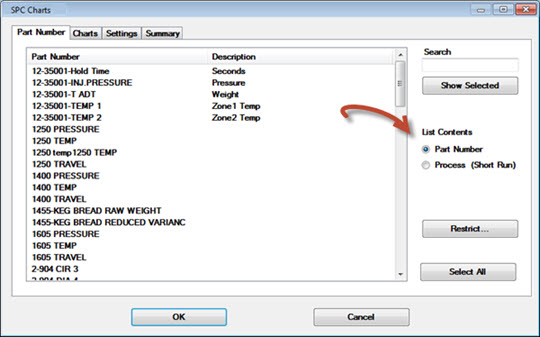Selecting Part Numbers or Processes
Use the Part Number tab on the
SPC Charts dialog to select multiple
standards (part numbers)
or short run processes for SPC retrieval Charts.
One or more standards or processes must be selected. If you select all
of the existing SPC standards or all existing processes, GainSeeker will
analyze data for all—including
any you may add in the future.
Locating
and selecting standards
Selecting a list of part numbers or short run processes to display
In the List Contents field on
the SPC Charts dialog, you can
select whether to display a list of part numbers or a list of short run
processes from which to choose. If you have established a Priority
list, this option will also be available (otherwise it is hidden
from view).
A priority list is a short list of items that is set up for each user
or group name. When you use priority lists, each person who logs in can
work with the short list of items they use the most. See Priority
Lists for more information.

Finding a standard in the list
For more information, see Finding
and selecting standards or processes
To: |
Do
this: |
Scroll through the standards list
or processes lists— |
Click the scroll
bar, or Click one item
in the list and then press the down arrow key, or Click one item
in the list and then type the first letter of the name of
the part number |
Change the sort order of the list
of standards— |

|
To restrict the list to showing
closer matches to a wanted standard— |
- Click the Search
text field and enter any part of the standard name

You can also enter a regular expression for this search. To do
so, your search must begin with R:
followed by the regular expression, like the following examples:
To find all standards that begin with "TEMP",
enter R:^TEMP as
the search string. To find all standards that end with "TEMP",
enter R:TEMP$ as
the search string. To find all standards that contain "Angle"
or "Bracket", enter R:Angle|Bracket as
the search string. |
Selecting one or more standards
For more information, see Finding
and selecting standards or processes
To: |
Do
this: |
Select one part number from the
list— |
Click on the
standard |
Select several part numbers listed
in sequence— |
Use
one of these methods:
Click the first standard you want to select. Press and hold the SHIFT key. Scroll to the last standard and click on it.
All standards between the first and last standards will also
be selected.
or
Click the first or last standard you want
to select. Press and hold the SHIFT
key. Press the arrow keys on the keyboard to scroll
up or down the list. |
Select several part numbers not
listed in succession— |
Click a list item and press and hold the CTRL
("control") key while selecting additional list
items Click the standards you want to select |
Select
all the standards in the list— |
Click the Select All button on the Part Number tab.
 Note:
If you select all SPC standards: Note:
If you select all SPC standards:
GainSeeker will proceed as if the Skip
single charts with no data and Skip
retrievals with no data on multiple charts check
boxes were selected. Any standards that do not have
data for the specified filter and date period will
not be listed in any of the charts or reports. If you store the resulting Individual
Charts in a Desktop, opening that Desktop will
only show the charts that were displayed when the
Desktop was saved. Any SPC standards that did not
have data when the desktop was saved, but now have
data when you are opening the Desktop, will not be
included in that Desktop. Similarly, if you generate Summary
Charts, any changes (e.g., Filter or Date Period)
or updates (e.g., refreshing the chart or storing
it in a Desktop and opening that Desktop later) will
be limited to SPC standards that originally returned
data when you first created the chart. |
|
Narrow the list of standards to
include only those with data meeting specific date ranges or filter
criteria— |
Click the Restrict button on the Part
Number tab. See Using
a date period to restrict the Part Number List and Using
a filter condition to restrict the Part Number list |

